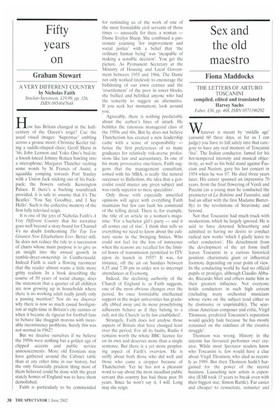Fifty years on
Graham Stewart
A VERY DIFFERENT COUNTRY by Nicholas Faith Sinclair-Stevenson, £19.99, pp. 326, ISBN 0954047643 How has Britain changed in the halfcentury of the Queen's reign? Cue the usual visual images: `Supermac' ambling across a grouse moor; Christine Keeler riding a saddle-shaped chair; Geoff Hurst in '66; John Lennon and Yoko Ono's bed-in: a knock-kneed Johnny Rotten bawling into a microphone; Margaret Thatcher reciting some words by St Francis of Assisi; a squaddie yomping towards Port Stanley with a Union Jack sticking out of his backpack; the flowers outside Kensington Palace. If there's a backing soundtrack provided, it is safe to assume that it's The Beatles' You Say Goodbye, and I Say Hello'. Such is the collective memory of the first fully televised reign.
It is one of the joys of Nicholas Faith's A Very Different Country that his narrative goes well beyond a story-board for Channel 4's no doubt forthcoming The Top Ten Greatest New Elizabethans Ever. Better still, he does not reduce the tale to a succession of charts whose main purpose is to give us an insight into the annual growth in tumble-dryer-ownership in Cumbernauld. Indeed Faith is such a flowing raconteur that the reader almost wants a little more gritty realism. In a book describing the course of 50 years of social change, does the statement that a quarter of all children are now growing up in households where there is no working adult really justify only a passing mention? Nor do we discover why there is now so much casual hooliganism at night-time in Britain's city centres or when it became de rigueur for football fans to behave like thuggish morons with incurable incontinency problems. Surely this was not normal in 1962?
But we deceive ourselves if we believe the 1950s were nothing but a golden age of clipped accents and public service announcements. More old Etonians may have gathered around the Cabinet table than at any other time in our history, but the only financially prudent thing most of them believed could be done with the great stately homes of England was to have them demolished.
Faith is particularly to be commended for reminding us of the work of one of the most formidable civil servants of those times — unusually for then, a woman — Dame Evelyn Sharp. She combined a passionate yearning 'for improvement and social justice' with a belief that 'the ordinary human being' was 'incapable of making a sensible decision'. You get the picture. As Permanent Secretary at the Ministry of Housing and Local Government between 1955 and 1966, The Dame not only worked tirelessly to encourage the bulldozing of our town centres and the 'resettlement' of the poor in tower blocks, she bullied and belittled anyone who had the temerity to suggest an alternative. If you seek her monument, look around you.
Agreeably, there is nothing predictable about the author's lines of attack. He belittles the timorous managerial class of the 1950s and 60s. But he does not believe Thatcherism has created a new leadership cadre with a sense of responsibility — hence the first preferences of so many graduates for relatively risk-averse professions like law and accountancy. In one of his many provocative one-liners, Faith suggests that the management consultant, armed with his MBA, is really 'the natural successor to Balholism. the idea that a generalist could master any given subject and was vastly superior to mere specialists'.
Only those with especially unsettled opinions will agree with everything Faith maintains but few can fault his command of the telling detail. There is, for example, the title of an article in a women's magazine: 'For a bachelor girl's party — and it all comes out of tins'. I think that tells us everything we need to know about the culinary scene in the Swinging Sixties. Who could not feel for the loss of innocence when the reasons are recalled for the limited hours of transmission permitted to ITV upon its launch in 1955? It was, for instance, off the air on Sundays between 6.15 and 7.30 pm in order not to interrupt attendances at Evensong.
Indeed, the declining authority of the Church of England is, as Faith suggests, one of the most obvious changes over the period. Its once formidable intellectual support in the major universities has gradually ebbed away and its more proselytising adherents behave as if they belong to a cult, not the Church 'as by law established'.
Strangely, Faith does not analyse those aspects of Britain that have changed least over the period. For all its faults, Radio 4 remains worth the whole BBC licence fee on its own and deserves more than a single sentence. But there is a yet more perplexing aspect of Faith's overview. He is sniffy about both those who did well and those who came a cropper because of Thatcherism. Yet he has not a pleasant word to say about the most steadfast public servant this country has had these past 50 years. Since he won't say it, I will. Long may she reign.






































































 Previous page
Previous page